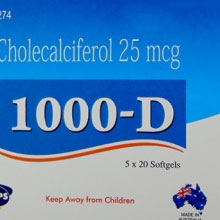
1000 - d caps Uses
Vitamin D (ergocalciferol-D2, cholecalciferol-D3, alfacalcidol) is a fat-soluble vitamin that helps your body absorb calcium and phosphorus. Having the right amount of vitamin D, calcium, and phosphorus is important for building and keeping strong bones. Vitamin D is used to treat and prevent bone disorders (such as rickets, osteomalacia). Vitamin D is made by the body when skin is exposed to sunlight. Sunscreen, protective clothing, limited exposure to sunlight, dark skin, and age may prevent getting enough vitamin D from the sun.
Vitamin D with calcium is used to treat or prevent bone loss (osteoporosis). Vitamin D is also used with other medications to treat low levels of calcium or phosphate caused by certain disorders (such as hypoparathyroidism, pseudohypoparathyroidism, familial hypophosphatemia). It may be used in kidney disease to keep calcium levels normal and allow normal bone growth. Vitamin D drops (or other supplements) are given to breast-fed infants because breast milk usually has low levels of vitamin D.
How 1000 - d caps works
Cholecalciferol 25 mcg Equiv. to Vitamin D3 1000 IU contains Vitamin D3 which helps in calcium absorption and thus may prevent osteoporosis later in life.
Vitamin D deficiency is a common underdiagnosed condition.
Studies suggest that vitamin D is important for reducing the risk of type 1 diabetes mellitus, cardiovascular disease, certain cancers, cognitive decline, depression, pregnancy complications, autoimmunity, allergy, and even frailty.
The blood level of 25(OH)D is the best method to determine vitamin D status.
Vitamin D deficiency during pregnancy may influence fetal imprinting that may affect chronic disease susceptibility soon after birth as well as later in life.
An effective strategy to prevent vitamin D deficiency and insufficiency is to obtain some sensible sun exposure, ingest foods that contain vitamin D, and take a vitamin D supplement..
Common side effects of 1000 - d caps
Vitamin D at normal doses usually has no side effects. If you have any unusual effects, contact your doctor or pharmacist promptly.
If your doctor has directed you to take this medication, remember that he or she has judged that the benefit to you is greater than the risk of side effects. Many people using this medication do not have serious side effects.
Too much vitamin D can cause harmful high calcium levels. Tell your doctor right away if any of these signs of high vitamin D/calcium levels occur: nausea/vomiting, constipation, loss of appetite, increased thirst, increased urination, mental/mood changes, unusual tiredness.
A very serious allergic reaction to this drug is rare. However, get medical help right away if you notice any symptoms of a serious allergic reaction, including: rash, itching/swelling (especially of the face/tongue/throat), severe dizziness, trouble breathing.
This is not a complete list of possible side effects. If you notice other effects not listed above, contact your doctor or pharmacist.


